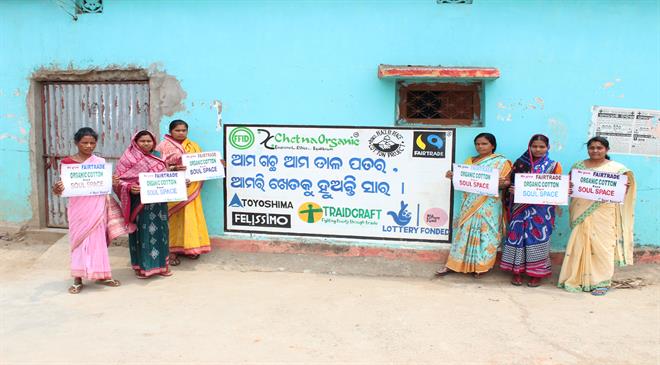All fashion should be fair, transparent and ethical
Activewear brand Soul Space promotes organic cotton farming and responsible manufacturing by uniting sustainability with style. Director Rajat Jaipuria in conversation with Subir Ghosh.
Please tell us how you started.
We are aware about the factories who help farmers with organic farming, fair wages, fair supply chain, etc. But the final product was exported to different countries. It was then we realised that we need to work on the organic footprint in India as well. There are very few brands in India who promote organic and Fairtrade-certified products. Hence, we thought about starting an activewear brand in India. And, thus began the journey of Soul Space.
Implementing any idea is not easy. So, how did you surmount those problems?
Decision-making involves choosing among alternatives. Problem solving entails creating or discovering the alternatives. Every problem includes an unsatisfactory situation, a desired goal, and obstacles that must be surmounted to reach the goal. We tailored the problem-solving process to fit some specific characteristics: task complexity, degree of solution multiplicity, intrinsic interest and cooperate requirements. The learning curve has been very steep for us, but yes, we have learnt and implemented and working together with our team to keep the brand running smoothly and educating the Indian youth about organic and Fairtrade clothing.
Why did you get into this? Was it because of passion and belief?
We got into building this brand because we believe that we need to give back to people and planet. Any idea/plan for the betterment of people-no matter how small-it will definitely see momentum and fall into place with hard work and dedication.
How do you see yourself (as an organisation) now? Did you step in too early? Or maybe too late?
We feel that there is very little awareness about organic farming and clothing in India. The market is still nascent. We have come in at the right time and we believe that we will bring out the change for better in everyone's lives and touch their soul with our clothing.
From idea to implementation is never smooth. How much of course correction did you have to do?
From idea to implementation for any company can never be a smooth curve, and neither was ours. We have walked up steep stairs and thankfully the journey so far has been up uphill. We have taken corrective measures and faced detours, but have always come out with a little more wisdom to bring out the change we are aiming for, for our people and planet.
How many people were involved in the conceptualisation of the project? Who all?
Sanjay Sarda, Rajesh Mundra and Rajat Jaipuria were involved in the conceptualisation of the project. From designing to ethically producing the clothing to planning on the supply chain and reaching the target audience, all elements were deeply thought and planned. Every stitch, every fibre at Soul Space breathes organic and Fairtrade telling a story of how to be beautiful on the inside and outside.
How successful has your project been so far in terms of financial viability?
We feel that we have just begun our journey. Our mission is to come up with two/three stores in a year's time to reach our vision of a better planet gradually. We are planning to invest Rs2 crore, and within two years we will be financially viable.
What about outreach? How much do you think you have been able to place yourself as a brand?
People are wired to trust third party recommendations more than someone talking about themselves. We are looking forward to participate in outreach marketing from individuals with large social presence who fit with our brand's concept. We are looking forward to having a real relationship with our buyers. We want to touch their soul through our clothing. So far, we have been able to achieve in small potions but to bring out a bigger change we need time, as we all know Rome was not built in a day!
How would you sum up your idea and understanding about sustainability?
Sustainable fashion is a part of the growing design philosophy. Sustainable fashion is about being kind to our environment, responsible with our resources and treating our fellow garment workers like human beings. This means looking at the tag, using what you have and being creative in our wardrobe choices.
And how does your project fit into this understanding/idea?
Our project is #madeinindia with the cotton #sowninindia for every person who feels for mother earth and believes that everyone should be treated equally and fairly.
What role do you think that the overall cotton/textiles/apparel/fashion industry can and should play in overall sustainable development? In what way?
We believe that all fashion should be made fairly, transparently and ethically. India has a huge influence on how our fashion is made globally. We are also a huge consumer market. We want to make sure that measures are taken to look after our workers and makers, but most importantly those that wear our clothes.
Do you think terms like sustainable fashion / green fashion / eco fashion / responsible fashion, etc, have become small, niche segments?
Yes, we believe that eco fashion/ green fashion/ sustainable fashion belong to a niche audience in the present scenario. But we are going to bring that change because our brand is backed by a duty towards people and planet.
What do you yourself (both as individual and organisation) do to ensure that your own supply chain (both upstream and downstream, as applicable) remains sustainable?
All Soul Space clothing has been certified by Fairtrade and GOTS. We have worked too hard to achieve their standards for approval and we ensure that these are maintained.
The term "sustainability" has also become a greenwashing tool. Without transparency, sustainability means zilch. So, how transparent are you?
We have always been an open book regarding how sustainable our brand is and how a fair supply chain is maintained. We believe that our certifications speak for us, and hence greenwashing seems merely a term in the dictionary for us.

Sustainability is a lifestyle issue. Comments?
Creating a sustainable lifestyle takes a lifelong commitment-to learning, experimenting, exploring, committing to increasingly sustainable practices and, above all, loving. Sustainable living is a lifestyle that attempts to reduce an individual's or society's use of the earth's natural resources and personal resources. It requires a complete shift in how we live our lives. It has perceptual, emotional, behavioural, and international dimensions.
Do you think Indian citizens are lagging behind in terms of awareness and lifestyle changes?
Yes, we feel that Indian citizens are lagging behind in terms of awareness and very many lifestyle changes have to be undergone.
What are the challenges that you see ahead?
Brand sensitivity, brand loyalty, sustainability, inventory intelligence is only a few of the challenges that we see as a conscious fashion brand.
What kind of policy changes do you think will work towards making all this happen?
We are working together and learning on a daily basis. Ethical principles include expressing one's views sensitively, focusing on the issues, and, while expressing disagreement, challenging the idea but not the person. Disagreements should be based on substance, not innuendo.




